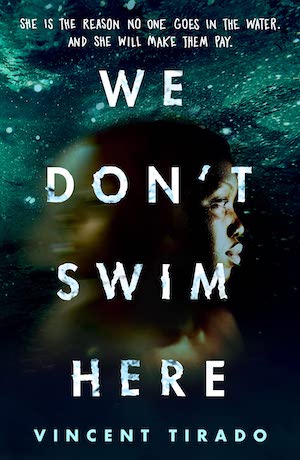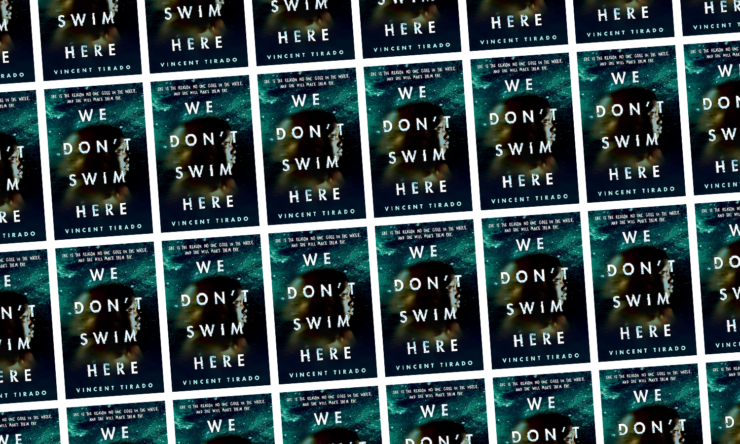When her grandmother Lala is moved into hospice care, Bronwyn and her parents relocate to her father’s hometown in Arkansas. The plan is to stay for a year, clean out Lala’s old house, and prepare for her imminent death. Their homecoming is not a welcome one. Bronwyn’s father is in the midst of a multi-year cold war with his brother, her cousin Anais is standoffish and secretive, and her new classmates are actively hostile. All Bronwyn wants to do is swim and prepare for Olympic tryouts, but whenever she asks about it she’s given a warning: “we don’t swim here.”
The pool has been drained and locked up, and the lake is avoided at all costs. Whatever is going on with everyone’s fear of water is connected to their creepy rituals. Students are “sacrificed” to the lake and whole areas of town are marked off limits. Someone is stalking—or hunting?—Bronwyn and her family. The sheriff is not only of no help but may actually be conspiring against them. Anais tries to keep her cousin out of it, but Bronwyn’s curiosity pulls her in anyway. All Anais can do now is steer clear of the ghost haunting the town and try to keep Bronwyn alive.
There’s a lot to like about We Don’t Swim Here, but also a lot that some readers expecting an easier read might find challenging. Anais and Bronwyn are frustrating and messy, but if you’ve ever had a fraught relationship with relatives then their constant bickering and withholding of information will feel familiar. The overly complicated rules and rituals that locals keep opaque from strangers may seem odd, but if you’ve ever lived somewhere with a lot of multigenerational white locals then you’ll know why they behave the way they do. The pervasive feeling of being an outsider in a place you live will make sense if you’ve ever been one of the only people of color or queer people in a predominantly white cishet space. As someone who grew up with many of these same experiences, I got a little vicarious thrill from watching the town ghost take her revenge on the people who harmed her.
Buy the Book


We Don’t Swim Here
Back in February, I read an interview with Tirado in part about the influence Stranger Things had on their novel Burn Down, Rise Up:
Before then, I hadn’t consumed many horror stories that pulled inspiration from history, so this really stood out to me. I thought about how I would go about writing a horror novel, and had this single idea: What if something like Stranger Things happened in the Bronx? And I don’t mean recreating the same character archetypes and painting them Black and Brown. I mean, what if I pulled inspiration from Bronx history to tell a horror story? What would that look like?
This same thread also appears in We Don’t Swim Here. Both novels are fantastical horror rooted in real history. Burn Down, Rise Up is bound up in the history of the Bronx and Tirado’s own experiences of learning about that history. We Don’t Swim Here pulls from Black folks’ complicated relationship with swimming, white people’s often violent reactions toward desegregating pools, and the way white supremacy can rewrite a racist event until it becomes thought of as a harmless urban legend or forgotten moment that bears no connection to today.
As someone who has studied Black history in the US, I really appreciate the way Tirado uses the real past to peel back the rose-tinted mythology that is both strangling the present and setting the future up for failure. Without spoiling the big reveal, I’ll say that the novel explores what it’s like to be one of the only people of color—and particularly one of the only Black people—in a predominately white space, and what it’s like when you can’t just go to the next town over to find Black culture, when you’re trapped in a place that always marks you as “other” and where racism is more undercover but no less virulent.
Vincent Tirado’s debut young adult horror novel, Burn Down, Rise Up, has been raking in awards and “best of” lists since its release in 2022, and for good reason. It’s speculative yet grounded in reality, frightening yet empowering, and centers characters who don’t usually get to star in horror stories. We Don’t Swim Here is proof that Tirado is neither a one-hit-wonder nor someone who suffers from sophomore book syndrome. I’m going to be thinking about this book for a long time.
We Don’t Swim Here publishes May 30th with Sourcebooks Fire.
Alex Brown is a Hugo-nominated and Ignyte award-winning critic who writes about speculative fiction, librarianship, and Black history. Find them on twitter (@QueenOfRats), instagram (@bookjockeyalex), and their blog (bookjockeyalex.com).










